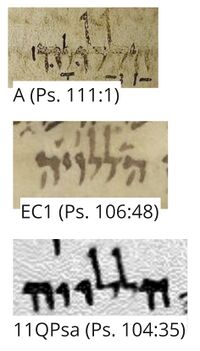Psalm 111/Notes/Grammar.V. 1.401937
From Psalms: Layer by Layer
- Is הַלְלוּ יָהּ a clause ("praise Yah") or a single-word exclamation ("Hallelujah!")? In the MT, הַלְלוּ יָהּ is treated as two words; sometimes הַלְלוּ and יָהּ are joined by maqqef, and, when they are not, each word receives its own accent (e.g., Ps. 111:1 - הַ֥לְלוּ יָ֨הּ ׀). The division of הַלְלוּ יָהּ into two words suggests (though it does not require) that the words are understood as a clause: "praise Yah." By contrast, the LXX does not translate הַלְלוּ יָהּ as a clause, but rather transliterates הַלְלוּ יָהּ as an exclamation: Αλληλουια (cf. Revelation 19: Αλληλουια; Jerome: Alleluia; Targum: הללויה; so HALOT). In the DSS, הללו יה is sometimes written as two words (e.g., 4QPsf Apostrophe to Judah) and sometimes as one (e.g., 4QPsd, 4QPse), though sometimes it is difficult to tell. In the Babylonian manuscript EC1 (Ps. 106:48), הללויה is written clearly as a single word.
- If הללויה was added by the final editors of the psalter not too long before the LXX was translated,[1] then it should probably be interpreted as the LXX understood it: as a single-word exclamation.
- The preposition בְּ, although prefixed to סוד, governs סוד and עדה (cf. LXX: ἐν βουλῇ εὐθείων καὶ συναγωγῇ).[2]
